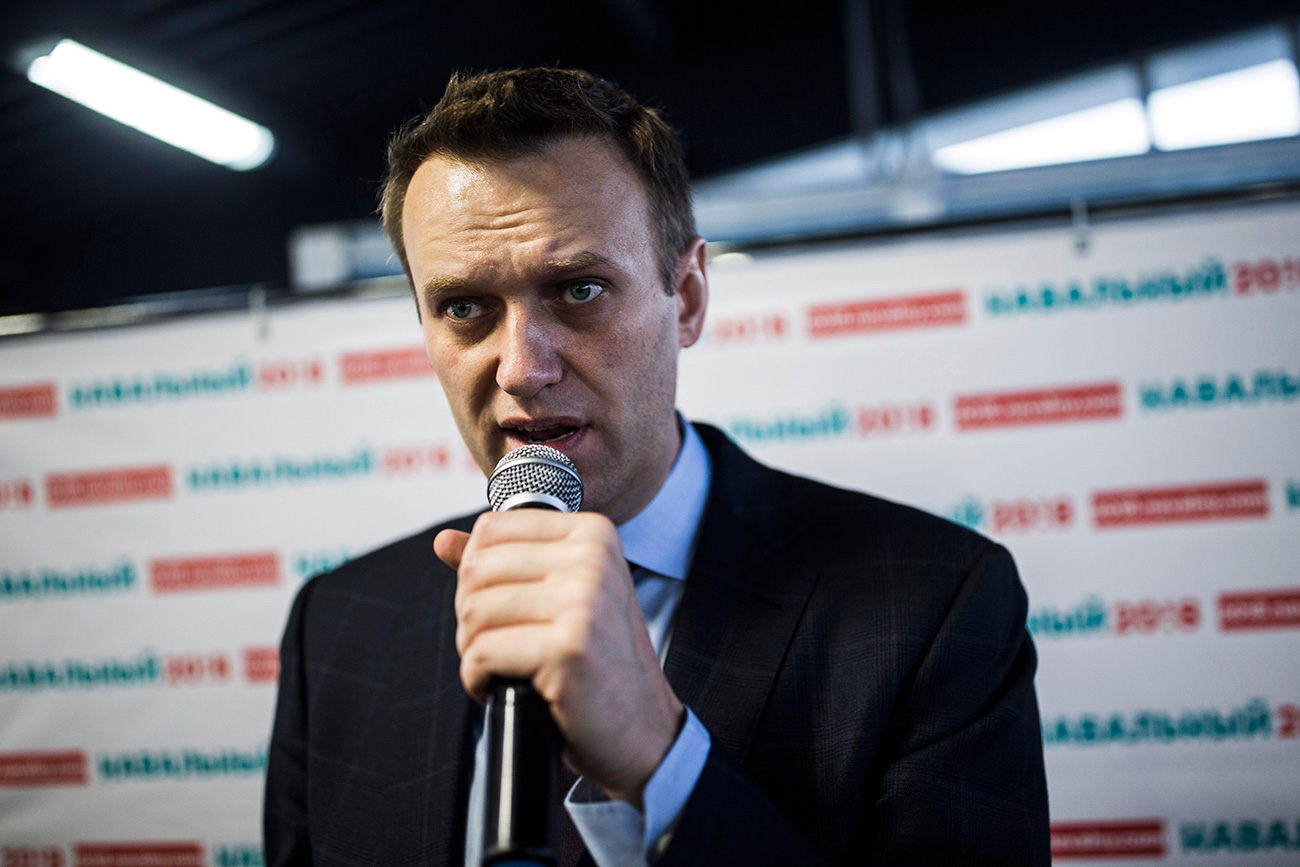
Russian opposition leader Alexei Navalny speaks at the opening of his campaign office in Chelyabinsk, in the Ural Mountains, Russia, Saturday, April 15, 2017.
APHe now seems to be everywhere, and rivals Beyoncé and Kim Kardashian for column inches. There are magazine covers, lengthy biographical profiles and endless news reports covering his latest travails.
Newsweek asks, "Is Russia's anti-corruption crusader Vladimir Putin’s kryptonite?" And Great Britain’s state-run BBC calls him "Russia's vociferous opposition leader."
Meanwhile, The Guardian, devoting its Saturday interview to the subject, said he is "determined to stop" Putin, and Bloomberg published an activist who embedded himself with the presidential hopeful.
The man concerned is Alexei Navalny, and he’s quickly becoming a household name. In the West, that is. Meanwhile, in Russia where people who actually vote in Russian elections reside, the data suggests he’s not as popular as western correspondents in Moscow are telling their readers, listeners and viewers back home. This seems to be yet another example of irresponsible, or just inept, reporting that distorts perceptions of Russia abroad.
In the English-speaking world, Navalny is becoming known as a kind of progressive figure who can bring "European values" to Russia. For instance, The Guardiandescribed him as a "a nationalist turned liberal" which is simply not true, and something the man himself admitted to the same newspaper a few weeks later, when he insisted he doesn’t regret describing Central Asian migrants as "cockroaches." Such a viewpoint hardly belongs to a bleeding-heart humanist.
One of the biggest misrepresentations came from the Pierre Omidyar and George Soros-backed Global Voices, where a senior figure at the Moscow Timestold us "how Alexey Navalny abandoned Russian nationalism." This supposition exhibits either genuine ignorance of Russia or a deliberate attempt to mislead readers. On the contrary, Navalny is openly proud of his ability to attract support from jingoists, seeing it as a "strength."
This week, the independent Levada Centre released (in Russian) data that gives a snapshot of current Russian attitudes toward Navalny and his chances of dislodging Putin next year. It also provides new insights into how people now consume news in this vast country. But, because they challenge the overriding narrative, they have been pretty much ignored by a western media that likes to cite Levada’s conclusions only when it suits their agenda.
Pollsters asked, "If the next Russian election was held this Sunday, who would you vote for?" Results were as follows: 48 percent for Putin; 3 percent for both Vladimir Zhirinovsky (leader of the misnamed ‘liberal’ group) and Gennady Zyuganov (the long-time Communist Party surpremo); and just one percent for Navalny. A number of other candidates also finished at one percent, while 42 percent either said they wouldn't vote at all, or don’t know.
In other words, despite all the fawning coverage of Navalny abroad, he still attracts three times less followers than Zhirinovsky and Zyuganov, now elderly and completely spent forces, and a whopping 48 times less supporters than Putin. So, using figures from the Canadian academic Paul Robinson, if you discount the undecided and those who don’t care, the result would be: Putin – 83 percent; Zhirinovsky – 5 percent; Zyuganov – 4 percent; Navalny – 2 percent; Others – 6 percent.
This means that across the western world the mainstream media is hoodwinking the general public into believing that Navalny is a genuine threat to Putin. For some context, it’s akin to Russian and Chinese media informing their readers how the American Green Party leader, Jill Stein, is a realistic candidate to defeat the Republican or Democratic nominee to be the next occupant of the White House. This would, naturally, be baloney.
Now, the usual refrain that we hear claims that Navalny is suffering from a lack of exposure on Russian television, which is "controlled by the Kremlin." But statistics released this week also knock that trope on the head.
According to the respected newspaper Vedomosti (in Russian), citing the Medialogy research centre, domestic mentions of Navalny have multiplied by a factor of five so far this year. In fact, he was the sixth most featured person in the entire Russian media after Putin, Donald Trump, Prime Minister Dmitry Medvedev, Kremlin press secretary Dmitry Peskov and Ukrainian President Petro Poroshenko. Amazingly, Navalny even received more coverage than Moscow Mayor Sergei Sobyanin, who is currently pushing through a controversial plan to rehouse around 10 percent of the capital’s residents.
Further undermining the "Kremlin managed TV" argument was new information from the All-Russian Public Opinion Research Center that revealed how only 52 percent of Russians now regard television as their main source of news and 32 percent now principally use the Internet. This is a twenty-point swing in just two years.
Given that Navalny is a skilled social media operator, with millions of followers on Twitter, Facebook and VKontakte and with a popular personal YouTube channel (his video, "He is not Dimon to You," about Medvedev has had almost 21 million views to date), it’s clear that access to the public is not Navalny’s biggest problem.
Instead, his main difficultly appears to be the overwhelmingly popularity of Putin, and an inability to, at least for now, convince Russians to believe in his platform and ability to lead their country. Responsible western correspondents should report these facts, instead of whipping up nonsense about a candidate who has some reasonably significant support in Moscow, but who has obviously failed to build a sizable base in the regions, which is where 90 percent of Russian voters live.
If using any of Russia Beyond's content, partly or in full, always provide an active hyperlink to the original material.
Subscribe
to our newsletter!
Get the week's best stories straight to your inbox